AZACITIDINE - INJECTION
PHONETIC PRONUNCIATION: (ay-za-SYE-ti-deen)
COMMON BRAND NAME(S): Vidaza
GENERIC NAME(S): azacitidine
Uses
USES: This medication is used to treat a group of blood/bone marrow disorders (myelodysplastic syndromes-MDS) in which the bone marrow does not produce enough healthy blood cells. People with MDS usually have problems such as infections, anemia, and easy bleeding/bruising. Azacitidine is a chemotherapy drug. It is believed to work by helping your bone marrow grow normal blood cells so you will need fewer blood transfusions. Azacitidine also kills abnormal blood cells that have grown too fast and do not work properly.
How to use AZACITIDINE - INJECTION
HOW TO USE: This medication is given by injection under the skin or into a vein by a health care professional. If you are receiving the injection under the skin, your health care professional will change the injection site each time to lessen injury under the skin. This medication is injected as directed by your doctor, usually once a day for 7 days in a row. A 7-day course of this medication is called a cycle. This cycle is repeated every 4 weeks depending on your response and blood tests. The dosage is based on your medical condition, body size, lab tests, and response to treatment. Keep all medical/lab appointments.
Side Effects
Precautions
Interactions
Overdose
Images
Reviews
Faq for AZACITIDINE - INJECTION
Azacitidine injection is used to treat certain types of myelodysplastic syndromes (MDS) and acute myeloid leukemia (AML).
Azacitidine is a type of chemotherapy drug that works by interfering with the growth of cancer cells and preventing their multiplication.
Azacitidine is given as an injection under the skin or into a vein by a healthcare professional.
Common side effects of azacitidine injection may include nausea, vomiting, diarrhea, constipation, loss of appetite, fatigue, fever, injection site reactions, and low blood cell counts.
The effects of azacitidine may not be immediately apparent, and it may take several cycles of treatment to see a response. Your healthcare provider will monitor your progress and adjust your treatment accordingly.
Azacitidine should not be used if you are allergic to it or have certain medical conditions like severe liver or kidney disease. It is essential to inform your healthcare provider about any other medications you are taking or any pre-existing medical conditions you have.
Azacitidine may harm an unborn baby. It is not recommended for use during pregnancy or while breastfeeding. Consult with your healthcare provider for appropriate alternatives.
It is important to inform your healthcare provider about all the medications you are taking, including prescription drugs, over-the-counter medications, vitamins, and herbal supplements, as some medications may interact with azacitidine.
The dosing schedule for azacitidine will depend on your specific condition and its severity. Your healthcare provider will determine the appropriate dosing frequency.
Disclaimer
IMPORTANT: HOW TO USE THIS INFORMATION: This is a summary and does NOT have all possible information about this product. This information does not assure that this product is safe, effective, or appropriate for you. This information is not individual medical advice and does not substitute for the advice of your health care professional. Always ask your health care professional for complete information about this product and your specific health needs.

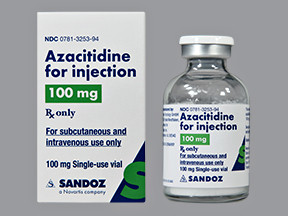
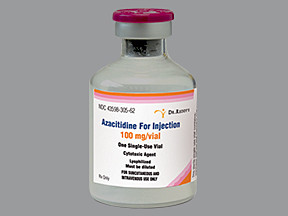
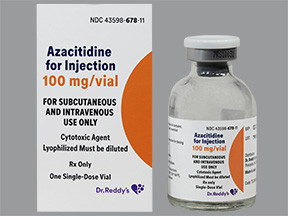
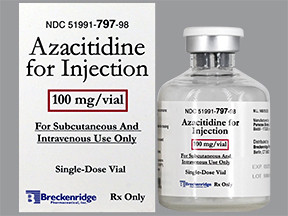
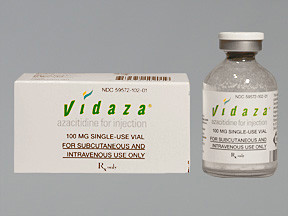
No Reviews Yet